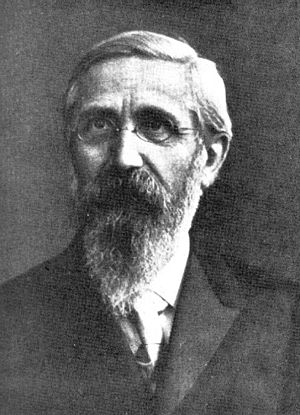Paul Natorp facts for kids
Quick facts for kids
Paul Natorp
|
|
|---|---|
 |
|
| Born | 24 January 1854 |
| Died | 17 August 1924 (aged 70) |
| Nationality | German |
| Education | University of Strasbourg |
| Era | 19th-century philosophy |
| Region | Western philosophy |
| School | Neo-Kantianism (Marburg school) |
| Institutions | Marburg University |
| Thesis | Descartes' Erkenntnistheorie: Eine Studie zur Vorgeschichte des Kriticismus (Descartes's Theory of Knowledge: A Study in the Pre-history of Criticism) (1882) |
| Doctoral advisor | Ernst Laas (PhD advisor) Hermann Cohen (Dr. phil. hab. advisor) |
| Doctoral students | Hans-Georg Gadamer |
| Other notable students | Nicolai Hartmann, Martin Heidegger, Ernst Cassirer, Karl Barth |
|
Main interests
|
Philosophical logic |
|
Influences
|
|
Paul Gerhard Natorp (born January 24, 1854 – died August 17, 1924) was an important German philosopher and educationalist. He helped start the "Marburg school" of a philosophy called neo-Kantianism. He was also very knowledgeable about the ancient Greek philosopher Plato.
Contents
About Paul Natorp
Early Life and Education
Paul Natorp was born in Düsseldorf, Germany. His father, Adelbert Natorp, was a Protestant minister.
Starting in 1871, Paul studied many subjects. He learned about music, history, old languages (classical philology), and philosophy. He studied at universities in Berlin, Bonn, and Strasbourg.
In 1876, he earned his first doctorate degree at the University of Strasbourg. His teacher was the philosopher Ernst Laas. Later, in 1881, he completed another important step in his studies called a Habilitation. This was under the guidance of Hermann Cohen, another neo-Kantian philosopher.
Teaching Career
In 1885, Paul Natorp became a special professor at Marburg University. By 1893, he became a full professor of philosophy and pedagogy (the study of teaching). He taught at Marburg until he retired in 1922.
In his last year of teaching, he had many deep discussions with Martin Heidegger. Heidegger was another famous philosopher who came to Marburg.
Family and Hobbies
In 1887, Paul Natorp married his cousin, Helene Natorp. They had five children together.
Besides philosophy, Natorp loved music. He was a talented composer and wrote many pieces. These included music for cello, violin, and piano. He also wrote about 100 songs and two pieces for choirs. He even wrote letters to the famous composer Johannes Brahms. Brahms, however, advised him not to become a professional musician.
His Influence on Others
Paul Natorp had a big impact on many students and thinkers. He influenced the early work of Hans-Georg Gadamer. He also greatly affected Edmund Husserl, who is known as the "father" of phenomenology.
Some of his well-known students included:
- The philosopher and historian Ernst Cassirer.
- The theologian Karl Barth.
- Boris Pasternak, who wrote the famous novel Doctor Zhivago.
Paul Natorp's Books
Paul Natorp wrote many books and papers on philosophy and education. Here are some of his important works:
- Descartes' Erkenntnistheorie (Descartes's Theory of Knowledge) (1882)
- Sozialpädagogik (Social Pedagogy) (1899)
- Logik in Leitsätzen (Logic in Principles) (1904)
- Gesammelte Abhandlungen zur Sozialpädagogik (Collected Papers on Social Pedagogy) (1907)
- Pestalozzi. Leben und Lehre (Pestalozzi. Life and Teaching) (1909)
- Die logischen Grundlagen der exakten Wissenschaften (The Logical Foundations of the Exact Sciences) (1910)
- Philosophie; ihr Problem und ihre Probleme (Philosophy; Its Problem and Its Problems) (1911)
- Sozialidealismus (Social Idealism) (1920)
- Beethoven und wir (Beethoven and Us) (1920)
- Platos Ideenlehre (Plato's Theory of Ideas) (1921)
- Allgemeine Logik (General Logic) (1979, published after his death)
See also
 In Spanish: Paul Natorp para niños
In Spanish: Paul Natorp para niños
 | Dorothy Vaughan |
 | Charles Henry Turner |
 | Hildrus Poindexter |
 | Henry Cecil McBay |

